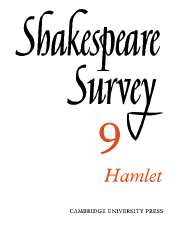Book contents
- Frontmatter
- Studies in Hamlet, 1901–1955
- English Hamlets of the Twentieth Century
- The Date of Hamlet
- Hamlet and the Court of Elsinore
- Hamlet’s ‘Sullied’ or ‘Solid’ Flesh: A Bibliographical Case–History
- Hamlet at the Globe
- Hamlet Costumes from Garrick to Gielgud
- Hamlet at the Comédie Française: 1769–1896
- The New Way with Shakespeare’s Texts: An Introduction for Lay Readers. III. In Sight of Shakespeare’s Manuscripts
- Shakespeare in the Bibliotheca Bodmeriana
- An Unpublished Contemporary Setting of a Shakespeare Song
- Garrick’s Stratford Jubilee: Reactions in France and Germany
- Shakespeare and Bohemia
- International Notes
- Shakespeare Productions in the United Kingdom: 1954
- The Tragic Curve: A Review of two Productions of Macbeth
- The Year's Contributions to Shakespearian Study 1 Critical Studies
- 2 Shakespeare’s Life, Times and Stage
- 3 Textual Studies
- Book Received
- Index
- Plate Section
English Hamlets of the Twentieth Century
Published online by Cambridge University Press: 28 March 2007
- Frontmatter
- Studies in Hamlet, 1901–1955
- English Hamlets of the Twentieth Century
- The Date of Hamlet
- Hamlet and the Court of Elsinore
- Hamlet’s ‘Sullied’ or ‘Solid’ Flesh: A Bibliographical Case–History
- Hamlet at the Globe
- Hamlet Costumes from Garrick to Gielgud
- Hamlet at the Comédie Française: 1769–1896
- The New Way with Shakespeare’s Texts: An Introduction for Lay Readers. III. In Sight of Shakespeare’s Manuscripts
- Shakespeare in the Bibliotheca Bodmeriana
- An Unpublished Contemporary Setting of a Shakespeare Song
- Garrick’s Stratford Jubilee: Reactions in France and Germany
- Shakespeare and Bohemia
- International Notes
- Shakespeare Productions in the United Kingdom: 1954
- The Tragic Curve: A Review of two Productions of Macbeth
- The Year's Contributions to Shakespearian Study 1 Critical Studies
- 2 Shakespeare’s Life, Times and Stage
- 3 Textual Studies
- Book Received
- Index
- Plate Section
Summary
This is a personal record; it is not a complete one. Its source is memory, reinforced by the study of some of the critical comment written at the time. Its purpose is to discover, if that is possible from such limited evidence, some of the significant developments in the treatment of the play during this century.
The first time I saw Hamlet was at Drury Lane in 1913. It was Forbes-Robertson’s farewell season—a genuine farewell for once, since he never appeared again except in charity performances during the First World War, and Hamlet was not among the charity plays. His impact upon a boy who already knew and greatly loved the play was tremendous: and though the memory is dim, it corresponds very closely with that described by the great critics. “Mr Forbes-Robertson takes the part quite easily and spontaneously” says Shaw on the 1897 opening of the production. Forbes-Robertson "enjoys (Shakespeare) and understands his methods of expression". I suspect that this sense of the actor being at one with the author, as well as of "his well-known grace and accomplishment", is the reason why the far-off impression remains for me one of such deep and happy satisfaction. The only parallel from my experience as a young playgoer is Matheson Lang's magnificent Othello. Lang seems to have been far less successful as Hamlet, just as Forbes-Robertson was in Othello: which leads to the reflection that the supreme success in Shakespeare is made by the actor who first of all "understands his methods of expression" and secondly is suited to the particular leading role.
- Type
- Chapter
- Information
- Shakespeare Survey , pp. 16 - 23Publisher: Cambridge University PressPrint publication year: 1956



